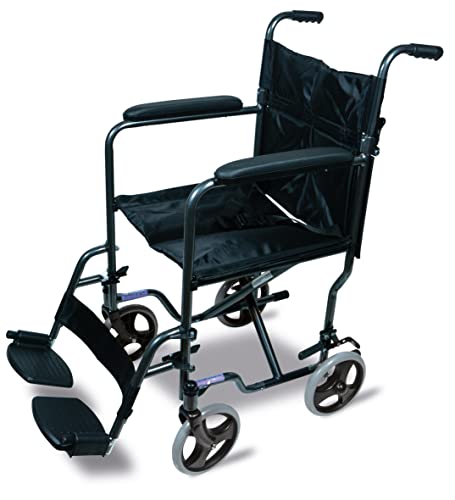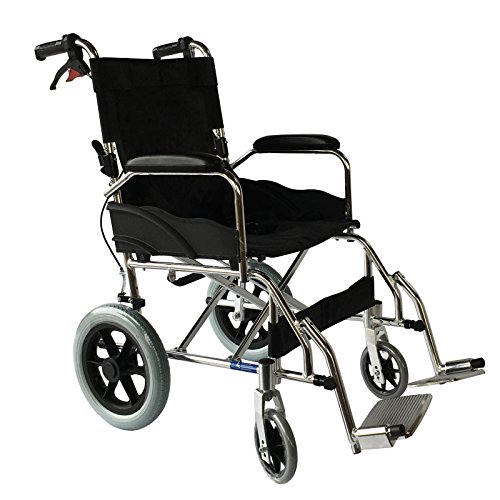10 Unexpected Wheelchair With Folding Arms Tips
페이지 정보

본문
 Wheelchair With Folding Arms
Wheelchair With Folding ArmsA wheelchair with arms that fold offers greater flexibility and comfort. This feature allows for the chair to fold horizontally, reducing its dimensions and making it easier to transport and store in cars.
Many of these wheelchairs include elevating footrests that swing away and padded nylon upholstery. They also come with 8" 1" solid front casters that provide smooth and durable gliding across most surfaces.
Vertical Folding
In order to ensure comfort and safety, wheelchairs are constructed with various features. They often include an adjustable lumbar cushion. This allows the user to alter the support's height so that it sits closer to their spine, which can help alleviate discomfort from pressure on various parts of their body, including the coccyx, spine, and bottom.
Another common feature of wheelchairs is the ability to change between manual and power mode. You can do this by lifting a lever near the rear wheels. This will put the wheelchair in manual mode. It will no longer be powered by motors and will be more movable. To make the chair power-up, simply flip the lever away from the chair.
Non-folding chairs are generally constructed with strong frames, which offer stability and long-lasting. These chairs are used for a long period of time and should be robust. These chairs are also an excellent alternative for those who require wheelchairs that can accommodate huge quantities of weight.
However, the drawback to non-folding wheelchairs is that they can take up more space in the vehicle than folding models. This is a concern when you don't own a a trunk that can accommodate a wheelchair. The weight of a wheelchair that isn't foldable can also be a problem for caregivers.
Folding wheelchairs are a great option for people who need to transport chairs often. They are constructed with an adjustable cross frame that can be collapsed, which makes them easier to transport in cars. These wheelchairs are also lighter than their non-folding counterparts. This makes them easier to lift and move.
The invention described hereinafter is a wheelchair that folds vertically with a resilient stop assembly. The stop assembly is comprised of a pair of side frame assemblies, each mounted rotatably to the upper frame member and occupying an initial stable position on the other side of a linkage assembly centerline. The linkage assembly is biased toward the first stable position and is sufficiently resilient to retain the side frame assemblies in the deployed condition until the occupant selectively-manipulates the linkage assembly.
Horizontal Folding
This type of wheelchair can be folded horizontally when it is stowed, which shortens the platform and makes it easier to put into the vehicle. It's the ideal chair for individuals who need to to maneuver their chairs into vehicles with low roofs, as well as for those with little storage space in their homes or cars.
This wheelchair is lightweight self propelled folding wheelchair and easy to fold, lift and transport. The wheelchair comes in a variety of configurations. It is available with height-adjustable arms and legrests that can swing away. The upholstery is covered with nylon to stop mildew and the growth of bacteria. Side panels protect the legs against sliding into the wheels.
Advanced wheelchair users may be able remove their rear wheels when they sit in the chair, which can allow them to move through small folding wheelchair spaces. This also allows them to change the tires to ones that are better suited to their new environment, or if they're planning on doing more outdoor activities.
The various types of wheelchair folding (visit Buzzbii`s official website) can be classified according to the direction of the hinge and the axial surface, as well as their degree of tightness. (Gentle folds; open folds close folds; isoclinal folds; overturned, recumbentfolds). Each of these categories has specific purposes, such as providing traction or preventing abrasion.
Some wheelchairs can tilt, which is helpful for those with a poor sitting ability and who are at risk of developing skin ulcers. This kind of wheelchair, also referred to as a "tilt in space" wheelchair is designed to distribute the user's weight evenly on the seat. This kind of wheelchair is often used by people with cerebral spinal cord injuries, cerebral or muscular conditions that make it difficult for them to use their legs. It's also a great choice for those looking to relieve pressure and prevent pressure ulcers. It can also aid those with scoliosis or dizziness to feel more secure. To tilt the chair, a switch is usually placed on the foot of the chair. It must be pressed to engage.
Quick-Release Wheels
The quick-release wheel enables wheelchairs to be disassembled and reduced in size and weight. It also allows for the simple inspection of wheels and the mounting of new tires. The system is comprised of a small rod referred to as a "skewer" that runs through the wheel axle and an elongated cam-lever that grips the wheels to hold them in the correct position. These systems can be operated by pressing the lever using your palm. There are two primary types of quick-release axles: the standard one, and a larger diameter version that is threaded into the frame and is called a thru-axle.
Before using a quick release, be sure that the skewer and cam are adjusted correctly. The narrow end of each spring should be positioned against the axle's ends and, when you tighten the skewer, it must fit into a recess in the inside of the adjusting nut or cam, or it will bend out of shape. It's easy to check this by spinning the skewer with the adjusting nut off and observing an open wedge between the skewer's broad end and the axle locknuts' inner faces.
You may need to open the lever, and then close it using some force. The lever should be tight that it leaves an impression on your palm and is sturdy enough to hold the wheel securely.
 Some cheap quick-releases contain plastic parts that lessen the force needed to clamp the wheel. Also, some cheap skewers are made from less-quality steel, so they can be more prone to rust.
Some cheap quick-releases contain plastic parts that lessen the force needed to clamp the wheel. Also, some cheap skewers are made from less-quality steel, so they can be more prone to rust.The lever should be set so that it sits flush with the frame, and has a curved form that stops it from snagging on any object. A protruding lever indicates that it is not fully closed, even though it could seem to be holding the wheel(s). A protruding lever can come loose if it is struck against something. To avoid this happening, make sure that the lever is secured and shut before each ride.
Arms that can be removed
There are a variety of arm designs for wheelchairs. Some are able to be turned over or completely removed. Some are adjustable in height to accommodate lap trays, while others might support one-sided arm supports to support a clerical position. Armrest pads are available in various materials that include hard plastic, self propelled lightweight folding wheelchair-skinned composite, or cushioned upholstery material. They are available in various colors, including the classic silver vein.
If you prefer not to use armrests or armrests, there are wheelchairs with no arm rests at all and permit users to put their arms on the sides of the chair. This can enhance functionality and make it simpler to sit at a desk or table and those who are active in their wheelchairs may feel that armrests can interfere with their independence or cause discomfort because they are too low.
If you do not have an armrest, your arms will pull your torso backwards and cause you to lean forward and adopt an slouched posture. Armrests can help take the force of gravity off your shoulders and arms as well as allowing you to support a tray or hold onto items with both hands.
Some wheelchairs have a fixed-height armrest that is unable to be flipped up or taken off. This kind of armrest can be used to support a tray or for moving. It is often too low to provide adequate arm support, and could cause discomfort.
Other models of wheelchairs come with removable rigging that is able to be removed when not required, and this can decrease the weight of the model, making it more convenient to move or transport. Some of these wheelchairs have a lighter frame construction, breathable seating material and Mag spokes.
Wheelchairs with removable rigging are less heavy than their collapsible counterparts. They offer the same high quality, durability and safety that other mobility devices provide, but with the added benefit of a smaller frame which allows for easier maneuvering in tight areas and for transportation.
- 이전글Guide To Travel Foldable Wheelchair: The Intermediate Guide On Travel Foldable Wheelchair 24.11.22
- 다음글What's The Current Job Market For Light Wheelchairs Folding Professionals? 24.11.22
댓글목록
등록된 댓글이 없습니다.